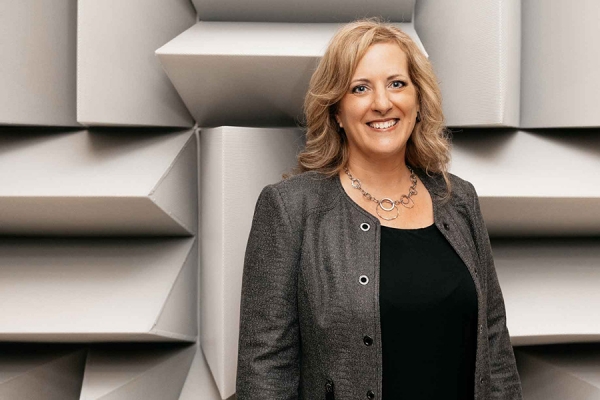 UWindsor grad Lisa Lortie has dedicated the past two decades of her career to ensuring the safety of vehicles before they hit the road.
UWindsor grad Lisa Lortie has dedicated the past two decades of her career to ensuring the safety of vehicles before they hit the road.
Despite a couple of challenging years fuelled by a pandemic, Lisa Lortie (BASc 1996, MBA 2000) has remained resilient.
In this time, she’s been dubbed a leader in the North American auto industry and her advice on navigating the automotive sector through the COVID crisis was published in a book produced by the Society of Automotive Engineers (SAE) called The Road Forward.
“Stellantis not only maintained learning and leadership development opportunities but increased and adapted them during this trying time,” says Lortie, who leads 10 Stellantis powertrain testing sites that handle everything from testing electric motors to traditional internal combustion engines to transmissions and emissions.
“We shifted to mask and ventilator production — and this happened so quickly, it was amazing. Despite the challenges we faced, we were still able to unveil new products, launch many vehicles, continue investments, and report record financial results.”
Lortie has dedicated the past two decades of her career to ensuring the safety of millions of vehicles before they hit the road. As global director of propulsion systems testing and analysis, Lortie oversees a professional team of nearly 1,400 scattered across the globe. While working remotely, she says it was critical for her to maintain and develop new mentoring relationships.
“Through all of this I have learned that we are resilient and adaptable and even if virtual and probably more so, human connection is crucial.”
Lortie says it’s critical for her team to be innovative to keep pace with the evolving technological landscape and determine optimal testing methods.
“Everything is moving towards electrification,” she says. “We need to stay on top of advances in technology because we are the ones responsible for the validation of the components.”
In 2020, Lortie joined the ranks of powerhouses like Mary Barra, the first female CEO of a “Big Three” automaker, when she was named among the Top 100 Leading Women in the North American Auto Industry by Automotive News.
“It’s pretty humbling,” she says. “I was always drawn to the garage and working with my hands, but I also was good in science and math. I put those two things together and engineering was the outcome. It has been a perfect career.”
Lortie says her curiosity in applied science was sparked at a young age by her parents, who were both teachers. She could often be found in the garage alongside her dad, immersed in woodworking projects, while her mom helped foster her interest in science and math.
In 2019, women made up 18 per cent of licensed engineers in the province, according to the Ontario Network of Women in Engineering. The same percentage is roughly equal to a slow but steadily growing number of females enrolling in undergraduate engineering programs at the University of Windsor.
“A lot of times you’re in a meeting, you look around the room and there are about 50 people, but you’re the only woman,” Lortie says. “Now, as a leader, I feel like it is my responsibility to bring up and promote women in the organization.”
While Lortie thinks it's vital to inspire women and minorities at a young age to pursue careers in STEM, she believes retention strategies are just as crucial.
“Even if you get a lot of women interested in STEM and they enter the workforce, a lot of them end up leaving — and that’s the unfortunate part. We need to have the retention in companies to keep them there.”
This includes more flexibility at work — for everyone, she adds.
“We finally offered a paternity leave at Stellantis. Partners need to have that flexibility as well because they are part of the equation.”
Lortie is a member of several Business Resource Groups at Stellantis and has led several equity support groups, where employees are invited to discuss their personal experiences with diversity and inclusion. She is also a member of the Society of Women Engineers and is involved in several initiatives that encourage young women to pursue careers in STEM.
“I consider myself an inclusive person, but I also recognize we all have internal biases, and I am looking to become more aware of these, as well as to more deeply understand issues that face others that I haven’t previously considered,” she says. “I truly think this is where change begins.”
Lortie’s experience with alternative fuels began in 1996 when her and her classmates converted a minivan engine from gas to propane for a North American competition hosted at UWindsor. She was a member of the Windsor Engineering Student Society and says a co-op placement with Ford Motor Company that took her from Ford’s Windsor engine plants to its operations in Australia, provided an invaluable experience.
“Between the classes, labs, and co-op experience, the education that I received at the University of Windsor gave me a good, all-around experience to prepare me for the working world.”
—Kristie Pearce
This article was featured in the latest issue of WE, the Faculty of Engineering’s annual magazine. To receive WE and UWindsor Engineering’s quarterly e-newsletters, join the faculty’s mailing list.
